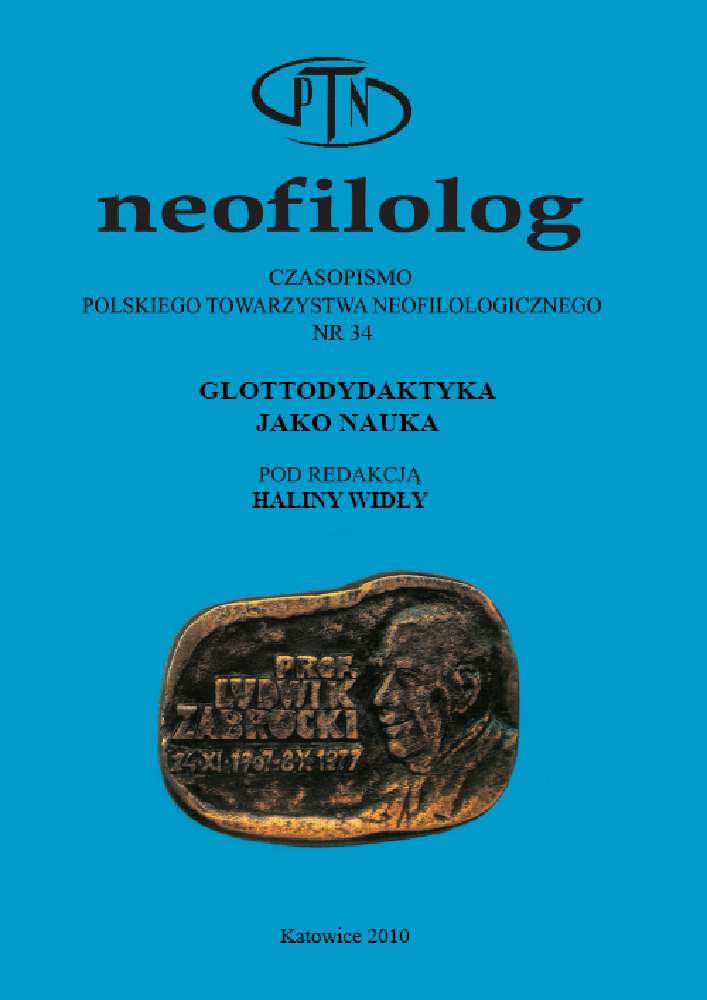Abstrakt
The article concerns the relation between linguistics and glottodidactics. In the first part, we present a synthesis of problems found when these two disciplines confront each other. The reply to the question about the identity of linguistics is the concept of a sign as a cluster of relations (cognitive, pragmatic, communicative, etc.) developed by Krąpiec in the sense proposed by Aristotle and St. Thomas Aquinas. Key also is the concept of a subjective and predicative structure as a tool to describe the conceptual structure. The cluster of relations mentioned before undergoes syntactic transformations in the text. This proposition considers both cognitive and communicative functions of a language and takes a positive stance on the experiences of foreign language didactics.
Bibliografia
Bloomfield, L. 1925. „Why a linguistic society?” Language 1: 1 – 5.
Canelas-Trevis, S. 2009. La grammaire enseignée en classe. Le sens des objets et des manipulations. Frankfurt/M.: Peter Lang Bern.
Courtillon, J. 2001. « La mise en oeuvre de la « grammaire du sens » dans l’approche communicative ». Etudes de Linguistique Appliquée, 122: 153 – 164.
Dakowska, M. 1996. Models of Language Use and Language Leanrning in the Theory of Foreign Language Didactis, Frankfurt/M.: Peter Lang.
Florczak, J., Gajos M. (red.) 2008. Językoznawstwo a dydaktyka języków obcych: teoria i praktyka. Warszawa: Wydawnictwo Biblioteka.
Grucza, F. 1974. « Lingwistyka a glottodydaktyka”. Języki obce w szkole, 3: 133 – 143 (w) Metodyka nauczania jęz yków obcych w Polsce (1957-2007). (red.
Komorowska, H. 2007). Warszawa: Wydawnictwa CODN. 93 – 96.
Grucza, F. (red.) 1976. Glottodydaktyka a lingwistyka. Warszawa: Wydawnictwa UW.
Komorowska, H. (red.) 2007. Metodyka nauczania jęz yków obcych w Polsce (1957 – 2007). Warszawa: Wydawnictwa CODN.
Krąpiec, M.A. 1995. Jęz yk i świat realny, Lublin: Wydawnictwo KUL.
Marton, W. 1969. „Przydatność ćwiczeń gramatycznych w świetle teorii transformacyjnej i psycholingwistyki”, Języki Obce w Szkole. 1, (w) Metodyka nauczania języków obcych w Polsce (1957 – 2007) (red. Komorowska, H. 2007) Warszawa: Wydawnictwa CODN. 69 – 70.
Maryniarczyk, A. 2009. Rola języka naturalnego w metafizyce realistycznej, (w) Gaudium in litteris, (red. Janeczek S., Bajor W., Maciołek M.). Lublin: Wydawnictwo KUL, 665 – 677.
Melis, L., Swiggers, P., Desmet P. 1997. « Vers de nouvelles synthèses en linguistique française ? » Travaux de Linguistique. 34: 151 – 189.
Pawlak, M. 2009. „Nauczanie gramatyki języka obcego – kierunki i metody badań”, Neofilolog. 32: 65 – 84.
Sharwood-Smith, M. 1972. „Związki językoznawstwa z nauczaniem języków obcych”. Języki Obce w Szkole, 5, (w) Metodyka nauczania jęz yków obcych
w Polsce (1957 – 2007) (red. Komorowska, H. 2007). Warszawa: Wydawnictwa CODN. 90 – 92.
Schlauch, M., Reszkiewicz A. 1961. „Współczesne językoznawstwo a nauczanie języka angielskiego: ważniejsze pozycje bibliograficzne…” Języki
Obce w Szkole, 5, (w) Metodyka nauczania jęz yków obcych w Polsce (1957 – 2007) (red. Komorowska, H. 2007) Warszawa: Wydawnictwa CODN. 61 – 62.
Śliwa, D. 2006. „Propositions pour l’enseignement de la linguistique, de la grammaire descriptive et de la grammaire pratique du français à la philologie
romane”(w) Vers une nouvelle dimension des études romanes. (red. Tomaszkiewicz, T.). Łask: Oficyna Wydawnicza Leksem. 31 – 34.
Touratier, Ch. 1998. « Les grammaires universitaires de ces dix dernières années », Le français moderne, 36: 73 – 102.
Turula, A. 2006. „Gramatyka, zróbmy to con amore”. Jęz yki Obce w Szkole 5: 48 – 52.
Vetulani, G. 2006. „Comment enseigner la grammaire descriptive en philologie romane?” (w) Vers une nouvelle dimension des études romanes. (red. Tomaszkiewicz T.). Łask: Oficyna Wydawnicza Leksem, 20 – 30.
Zabrocki, L. 1966. Językoznawcze podstawy metodyki nauczania języków obcych. Warszawa: PWN.
Licencja
Prawa autorskie (c) 1970 Dorota Śliwa

Utwór dostępny jest na licencji Creative Commons Uznanie autorstwa – Bez utworów zależnych 4.0 Międzynarodowe.
Przedstawiany utwór (artykuł) upubliczniany jest na podstawie umowy z autorem i na licencji Creative Commons Attribution-NoDerivatives 4.0 International (CC BY-ND 4.0).
Użytkownicy mają obowiązek podania wraz z rozpowszechnionym utworem, informacji o autorstwie, tytule, źródle (odnośniki do oryginalnego utworu, DOI) oraz samej licencji;
- bez tworzenia utworów zależnych,
- utwór musi być zachowany w oryginalnej postaci.
Uniwersytet im. Adama Mickiewicza w Poznaniu zachowuje prawo do czasopisma jako całości (układ, forma graficzna, tytuł, projekt okładki, logo itp.).
